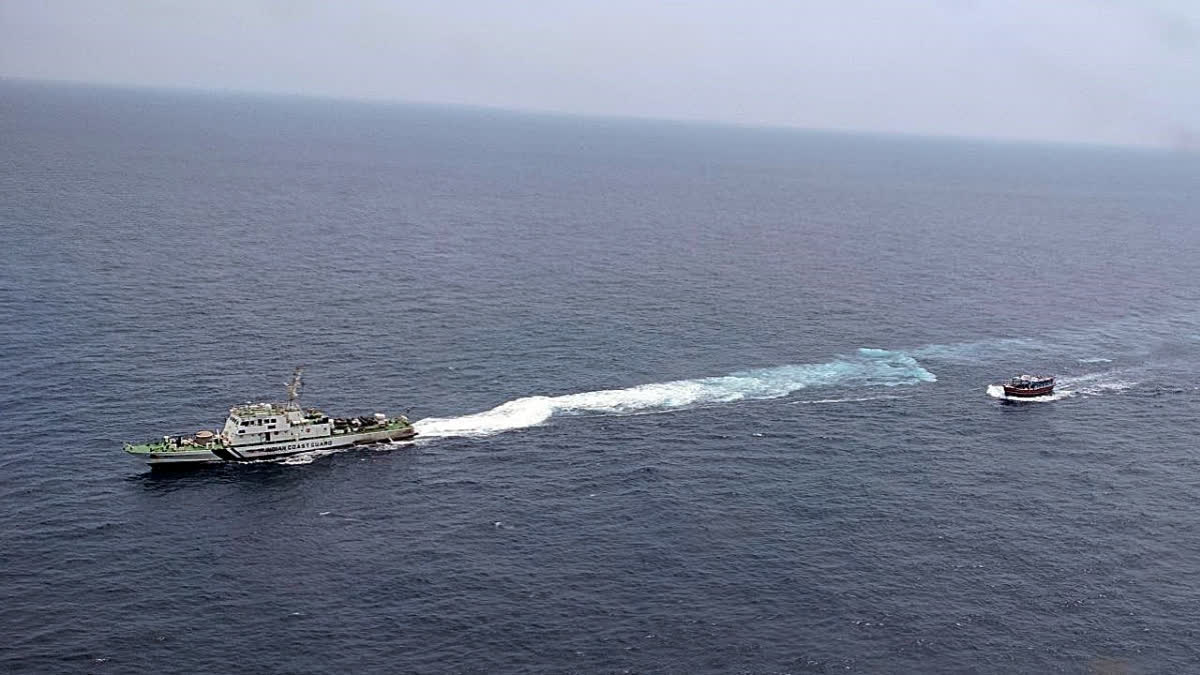New Delhi: In what can be seen as a significant development in terms of maritime security cooperation between Sri Lanka and India, the Sri Lankan Navy has sought to conduct joint operations with the Indian Navy to curb the menace of drug trafficking.
This comes after the Indian Navy last month helped the Sri Lankan Navy to intercept two Sri Lankan-flagged fishing boats that were carrying drugs. This was the first such instance of the Sri Lankan Navy receiving assistance from the Indian Navy in the high seas.
According to a report in the Daily Mirror news portal on Tuesday, Sri Lankan Navy Commander Vice Admiral Priyantha Perera has said that his force plans to increase collaborative deployments and operations in the Indian Ocean region, particularly in the high seas, alongside the Indian Navy to combat narcotics trafficking.
Referring to last month’s incident, Vice Admiral Perera said that upon receiving intelligence about possible narcotics trafficking on the high seas, the Sri Lankan authorities reached out to the Indian High Commission in Colombo.
“The Defence Attaché acted promptly and involved the Indian Navy, deploying aircraft and high-tech drones to locate and track the smuggling vessels,” he was quoted as saying. “Working closely with Sri Lankan authorities, two Indian Navy ships were dispatched to seize the narcotics-laden vessels.”
According to a statement issued by the Indian High Commission, based on information received from the Sri Lankan Navy regarding probable narcotics smuggling by Sri Lankan-flagged fishing vessels in the Arabian Sea, the Indian Navy responded swiftly through a coordinated operation to localise and intercept the boats.
“Extensive surveillance was undertaken by Indian Naval Long Range Maritime Patrol Aircraft and Remotely Piloted Aircraft, based on inputs from the Information Fusion Centre (Indian Ocean Region), Gurugram, and an Indian naval ship was deployed to augment efforts,” the statement reads.
It stated that the two boats were identified based on continuous inputs from the Sri Lankan Navy and aerial surveillance by Indian Navy aircraft. Subsequently, in a closely coordinated operation between the ship and the aerial assets, both boats were boarded by the ship’s boarding team on November 24 and 25, leading to the seizure of approximately 500 kg of narcotics (crystal meth) worth SLR 170 billion. One more Indian Navy ship was also tasked to augment the force level for the conduct of anti-narcotics operations. The two boats, along with crew and seized narcotics were then handed over to a Sri Lankan Navy ship at sea for further legal action.
“The operation symbolises the combined resolve of both navies to jointly address regional maritime challenges and ensure safety and security in the Indian Ocean Region,” the Indian High Commission statement further reads. “The government of India has also provided a Dornier maritime aircraft of the Indian Navy to Sri Lanka to enhance the island nation’s capability in maritime surveillance. It reaffirms India as the preferred security partner in the region and is also a testament to the benefits of closer bonds between the two countries and navies for the peoples of India and Sri Lanka.”
It is worth mentioning here that Sri Lanka’s location in the Indian Ocean, at the crossroads of major international shipping lanes, makes it a pivotal player in maritime security. The narrow Palk Strait and Gulf of Mannar serve as a corridor for illegal trafficking between the two nations and beyond.
India’s extensive coastline and its proximity to Sri Lanka make it vulnerable to drug trafficking networks. Strengthening maritime cooperation between the two countries ensures enhanced surveillance over these critical zones.
Both the Indian Navy and the Sri Lankan Navy participate in regional frameworks such as the Indian Ocean Rim Association (IORA) and the Colombo Security Conclave. These platforms encourage dialogue and joint efforts to combat trafficking. Mutual agreements like the Memorandum of Understanding (MoU) on drug trafficking and organised crime provide a legal foundation for cooperation.
According to Abhinav Pandya, founder, director and CEO of the Usanas Foundation think tank, the Sri Lankan Navy seeking to collaborate with the Indian Navy to check the menace of narcotics smuggling is an important development.
“Sri Lanka has emerged as a key nodal point in drug trafficking between the Golden Crescent and the Golden Triangle,” Pandya told ETV Bharat.
The Golden Crescent and the Golden Triangle are Asia’s two principal areas of illicit opium production. Located at the crossroads of Central, South, and West Asia, the Golden Crescent covers the mountainous peripheries of Afghanistan and Pakistan, extending into eastern Iran. The Golden Triangle is a mountainous region in northeastern Myanmar, northwestern Thailand, and northern Laos. It is centred on the confluence of the Mekong and Ruak Rivers.
“Trafficking of synthetic drugs has become a major headache for the entire region,” Pandya said. He explained that, from Sri Lanka, the drugs are taken to Europe and the West where there is a massive demand for them.
“Drug trafficking is also deeply interlinked with Islamist terrorism and insurgent groups in India’s northeastern region,” he said. “It causes major damage to India’s economy and security.”
Pandya further said that groups are operating within India that are involved in the distribution of drugs. The key entry points for such drugs are in Kashmir, Gujarat, Goa and also from the Sri Lankan side.
“India and Sri Lanka need to synergise their efforts to curb drug trafficking in strong coordination,” he said. Pandya described the Sri Lankan Navy’s plans to conduct joint operations with the Indian Navy as a “welcome development”.
“If properly channelised, it will go a long way in curbing the menace of drug trafficking,” he stated. The Indian Navy has advanced surveillance technology and satellite-based monitoring systems, while the Sri Lankan Navy has localised knowledge of coastal and territorial waters. To sum up, by leveraging their unique strengths and fostering deep collaboration, the Indian and Sri Lankan navies can play a pivotal role in curbing drug trafficking in the region.
Read more: Senior US Diplomat To Visit India, Sri Lanka, Nepal



